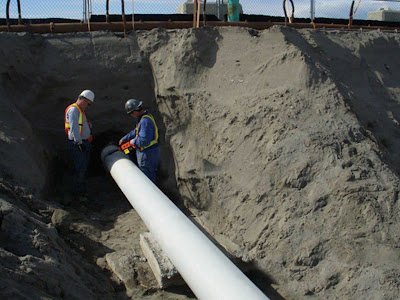Bulgaria has failed to pay its debt to Russia’s Transneft
under the Burgas-Alexandroupolis project, the company’s Vice President Mikhail Barkov said.Earlier, the two sides agreed on the debt payment by March 20. Bulgaria owns 7.3 million euros.
According to Barkov, Bulgaria failed to transfer the money, citing procedural difficulties. Transneft plans to inform the Russian Energy Ministry of the situation for it to make further decisions regarding the project.
Barkov said that Trans-Balkan Pipeline Company had enough money to last till May or June. “Clearly, neither we nor Greece will pay more,” he added.
The official noted that Russia would not give up the project entirely. If Bulgaria does not pay, the project will be put on hold, with the company keeping only one office in Amsterdam and one employee there.
However, Barkov said, “It is too early to speak about that.”
At a meeting of the supervisory council on February 17, the shareholders of the Burgas-Alexandroupolis project agreed that Bulgaria would pay the debt by March 20, 2011. Under the previous agreements, Bulgaria was supposed to make all outstanding payments in December 2010 but never did.
Earlier, Bulgarian authorities called for a revision of the energy agreements with Russia. This was followed by a number of statements indicating that the government had no interest in the project. Nor did Bulgaria make obligatory payments under the project.
However, Greece said that the construction of the Burgas-Alexandroupolis pipeline was a priority task for its government.
“At a meeting between the Greek Ministry of the Environment and the Russian Energy Ministry in October, we agreed to step up coordination within the joint working group on energy,” Deputy Minister of Environment, Energy and Climate Change of Greece Yannis Maniatis said earlier.
The project has passed a preliminary environmental examination in Greece. “This is of special importance because one of the three EU states involved in the project is approving the preliminary environmental survey on the basis of all European environmental requirements. This sends a clear signal to the other side [Bulgaria] that it would be strange if it did not take our results of the environmental examination of the project,” the deputy minister said.
The cost of the Greek section of the pipeline is around 1.5 billion U.S. dollars. “It will be built by Greek companies for around 2.5 years. In addition to a permanent income of 35-50 million euros a year, more than 1,500 new jobs will be created in the Greek region of Thrace during the construction of the pipeline will run, and more than 150 permanent jobs during its operation,” Maniatis said.
The Burgas-Alexandroupolis pipeline is an oil pipeline that will be used to transport Russian and Caspian oil from the Bulgarian Black Sea port of Burgas to the Greek Aegean port of Alexandroupolis. The pipeline will be an alternative route for Russian oil bypassing the Bosporus and the Dardanelles. Its construction was supposed to begin in June of 2009 to be completed by the beginning of 2011.
The pipeline project was proposed in 1993-1994 by several Russian and Greek companies. In 1994, for construction of the pipeline Greece and Bulgaria signed a bilateral agreement, followed by a memorandum of cooperation, signed by Greece and Russia.
In February 1998, a Greek consortium for pipeline construction named Bapline was established, and in May 1998, a memorandum of creation of the Transbalkan Oil Pipeline Company was signed. In 2000, technical specifications and economic evaluation of the project were prepared by the German company ILF.
A joint protocol for preparing the pipeline's construction was signed by the three countries in January 2005. The political memorandum between governments was signed on 12 April 2005.
In May 2006, there was a controversy in mass media regarding the Bulgarian government's alleged withdrawal from the project, but this was denied later by Bulgarian officials. An inter-governmental agreement on the project was approved on February 7, 2007, and it was signed on March 15, 2007 in Athens by the ministers of the three countries in the presence of their leaders, President Vladimir Putin of Russia, Prime Minister Sergey Stanishev of Bulgaria, and Prime Minister Kostas Karamanlis of Greece. The agreement establishing the international project company was signed in Moscow on December 18, 2007 and the company-Trans-Balkan Pipeline B.V.-was incorporated in the Netherlands on February 6, 2008.
The pipeline will be constructed and owned by Trans-Balkan Pipeline B.V. where 51 percent of shares belong to the Burgas-Alexandroupolis Pipeline Consortium, a joint venture of Russian Transneft, Rosneft, and Gazprom Neft. Bulgarian Burgas-Alexandroupolis Project Company-BG, a joint venture of Bulgargaz and Transexportstroi, owns 24.5 percent of shares. Greece consortium HELPE S.A. - THRAKI S.A., a joint venture between Hellenic Petroleum and Thraki, which is owned by Prometheus Gas and the Latsis Group, owns 23.5 percent, while the Government of Greece has 1 percent.
source: Itar-Tass

